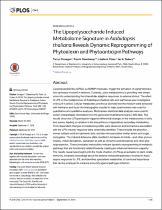 ResearchSpace
ResearchSpace
The Lipopolysaccharide-induced metabolome signature in Arabidopsis thaliana reveals dynamic reprogramming of Phytoalexin and Phytoanticipin pathways
JavaScript is disabled for your browser. Some features of this site may not work without it.
- ResearchSpace
- →
- Research Publications/Outputs
- →
- Journal Articles
- →
- View Item
| dc.contributor.author |
Finnegan, T

|
|
| dc.contributor.author |
Steenkamp, PA

|
|
| dc.contributor.author |
Piater, LA

|
|
| dc.contributor.author |
Dubery, IA

|
|
| dc.date.accessioned | 2017-04-10T10:35:18Z | |
| dc.date.available | 2017-04-10T10:35:18Z | |
| dc.date.issued | 2016-09-22 | |
| dc.identifier.citation | Finnegan,T., Steenkamp P.A., Piater, L.A., Dubery, I.A. 2016.The Lipopolysaccharide-induced metabolome signature in Arabidopsis thaliana reveals dynamic reprogramming of Phytoalexin and Phytoanticipin pathways :In PLoS ONE Vol. 11(10), pp 1–9 : doi:10.1371/journal.pone.0163572 | en_US |
| dc.identifier.issn | 1932-6203 | |
| dc.identifier.uri | 12. Description: Copyright: 2015 Elsevier. Due to copyright restrictions, the attached PDF file only contains the abstract of the full text item. For access to the full text item, please consult the publisher's website. The definitive version of the work is published in the Journal of Magnetism and Magnetic Materials, Vol. 375, pp 1–9 | |
| dc.identifier.uri | http://journals.plos.org/plosone/article?id=10.1371/journal.pone.0163572 | |
| dc.identifier.uri | http://hdl.handle.net/10204/9001 | |
| dc.description | Copyright: 2016 Public Library of Science. | en_US |
| dc.description.abstract | Lipopolysaccharides (LPSs), as MAMP molecules, trigger the activation of signal transduction pathways involved in defence. Currently, plant metabolomics is providing new dimensions into understanding the intracellular adaptive responses to external stimuli. The effect of LPS on the metabolomes of Arabidopsis thaliana cells and leaf tissue was investigated over a 24 h period. Cellular metabolites and those secreted into the medium were extracted with methanol and liquid chromatography coupled to mass spectrometry was used for quantitative and qualitative analyses. Multivariate statistical data analyses were used to extract interpretable information from the generated multidimensional LC-MS data. The results show that LPS perception triggered differential changes in the metabolomes of cells and leaves, leading to variation in the biosynthesis of specialised secondary metabolites. Time-dependent changes in metabolite profiles were observed and biomarkers associated with the LPS-induced response were tentatively identified. These include the phytohormones salicylic acid and jasmonic acid, and also the associated methyl esters and sugar conjugates. The induced defensive state resulted in increases in indoleÐand other glucosinolates, indole derivatives, camalexin as well as cinnamic acid derivatives and other phenylpropanoids. These annotated metabolites indicate dynamic reprogramming of metabolic pathways that are functionally related towards creating an enhanced defensive capacity. The results reveal new insights into the mode of action of LPS as an activator of plant innate immunity, broadens knowledge about the defence metabolite pathways involved in Arabidopsis responses to LPS, and identifies specialised metabolites of functional importance that can be employed to enhance immunity against pathogen infection. | en_US |
| dc.language.iso | en | en_US |
| dc.publisher | PUBLIC LIBRARY SCIENCE | en_US |
| dc.relation.ispartofseries | Worklist;18044 | |
| dc.subject | Lipopolysaccharides | en_US |
| dc.subject | Plant metabolomics | en_US |
| dc.subject | Biomarkers | en_US |
| dc.subject | Cellular metabolites | en_US |
| dc.title | The Lipopolysaccharide-induced metabolome signature in Arabidopsis thaliana reveals dynamic reprogramming of Phytoalexin and Phytoanticipin pathways | en_US |
| dc.type | Article | en_US |
| dc.identifier.apacitation | Finnegan, T., Steenkamp, P., Piater, L., & Dubery, I. (2016). The Lipopolysaccharide-induced metabolome signature in Arabidopsis thaliana reveals dynamic reprogramming of Phytoalexin and Phytoanticipin pathways. http://hdl.handle.net/10204/9001 | en_ZA |
| dc.identifier.chicagocitation | Finnegan, T, PA Steenkamp, LA Piater, and IA Dubery "The Lipopolysaccharide-induced metabolome signature in Arabidopsis thaliana reveals dynamic reprogramming of Phytoalexin and Phytoanticipin pathways." (2016) http://hdl.handle.net/10204/9001 | en_ZA |
| dc.identifier.vancouvercitation | Finnegan T, Steenkamp P, Piater L, Dubery I. The Lipopolysaccharide-induced metabolome signature in Arabidopsis thaliana reveals dynamic reprogramming of Phytoalexin and Phytoanticipin pathways. 2016; http://hdl.handle.net/10204/9001. | en_ZA |
| dc.identifier.ris | TY - Article AU - Finnegan, T AU - Steenkamp, PA AU - Piater, LA AU - Dubery, IA AB - Lipopolysaccharides (LPSs), as MAMP molecules, trigger the activation of signal transduction pathways involved in defence. Currently, plant metabolomics is providing new dimensions into understanding the intracellular adaptive responses to external stimuli. The effect of LPS on the metabolomes of Arabidopsis thaliana cells and leaf tissue was investigated over a 24 h period. Cellular metabolites and those secreted into the medium were extracted with methanol and liquid chromatography coupled to mass spectrometry was used for quantitative and qualitative analyses. Multivariate statistical data analyses were used to extract interpretable information from the generated multidimensional LC-MS data. The results show that LPS perception triggered differential changes in the metabolomes of cells and leaves, leading to variation in the biosynthesis of specialised secondary metabolites. Time-dependent changes in metabolite profiles were observed and biomarkers associated with the LPS-induced response were tentatively identified. These include the phytohormones salicylic acid and jasmonic acid, and also the associated methyl esters and sugar conjugates. The induced defensive state resulted in increases in indoleÐand other glucosinolates, indole derivatives, camalexin as well as cinnamic acid derivatives and other phenylpropanoids. These annotated metabolites indicate dynamic reprogramming of metabolic pathways that are functionally related towards creating an enhanced defensive capacity. The results reveal new insights into the mode of action of LPS as an activator of plant innate immunity, broadens knowledge about the defence metabolite pathways involved in Arabidopsis responses to LPS, and identifies specialised metabolites of functional importance that can be employed to enhance immunity against pathogen infection. DA - 2016-09-22 DB - ResearchSpace DP - CSIR KW - Lipopolysaccharides KW - Plant metabolomics KW - Biomarkers KW - Cellular metabolites LK - https://researchspace.csir.co.za PY - 2016 SM - 1932-6203 T1 - The Lipopolysaccharide-induced metabolome signature in Arabidopsis thaliana reveals dynamic reprogramming of Phytoalexin and Phytoanticipin pathways TI - The Lipopolysaccharide-induced metabolome signature in Arabidopsis thaliana reveals dynamic reprogramming of Phytoalexin and Phytoanticipin pathways UR - http://hdl.handle.net/10204/9001 ER - | en_ZA |





